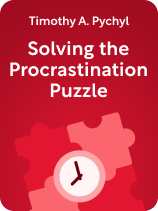

This article is an excerpt from the Shortform book guide to "Solving the Procrastination Puzzle" by Timothy A. Pychyl. Shortform has the world's best summaries and analyses of books you should be reading.
Like this article? Sign up for a free trial here.
How are procrastination and time management related? Why do people underestimate how long it takes to complete a task?
One reason why we procrastinate is that we have trouble with planning. Figuring out how to accomplish everything on your to-do list requires planning, but most of us aren’t very good at these kinds of plans.
Learn how bad planning and poor time management puts you on a direct path to procrastination.
We Genuinely Think We’ll Do It “Later”
Timothy A. Pychyl dives more into the relationship between procrastination and time management in his book Solving the Procrastination Puzzle. He says that you probably tell yourself that you don’t feel like doing a task now, but you’ll feel like it “later” or “tomorrow.” Almost every time, you’re definitely wrong, yet you genuinely feel like you’re right. That’s because, in addition to having trouble planning, your brain also has trouble predicting how you’ll feel in the future.
Because of a cognitive bias called focalism, you don’t think about all of the factors that will affect your mood in the future. You might really think you’ll feel like cleaning the house tomorrow night. But you’re likely not considering how a long day of work will leave you tired and an evening helping your kids with homework will make you grumpy about having to relearn fractions. Plus, because of a bias called presentism, you assume that how you feel now is how you’ll feel later. But this often isn’t accurate. You likely feel a lot more enthusiastic about leaving the cleaning until tomorrow in the present (as you’re making that decision) than you will in the future, when “tomorrow” is here and it’s time to get to work.
(Shortform note: Experts agree with Pychyl that our trouble predicting how we’ll feel in the future often trips us up and even makes us bad at anticipating what will make us happy. Strangers to Ourselves author Timothy Wilson and Stumbling on Happiness author Daniel Gilbert explain that because we overestimate how good or bad an event will make us feel or underestimate how quickly those feelings will pass, we overestimate the effect that a single event will have on our happiness. Gilbert also notes that when we think we’ll feel in the future the same way we feel now, due to presentism, we make poor decisions that won’t make us happy. These choices are often motivated by emotions that will quickly pass, not by rational thinking about the future.)
What to Do About It:
Pychyl explains that one of the best things you can do to stop your trouble with planning from leading to procrastination is to rethink your assumptions about motivation. It feels hard to get started on a task when you aren’t feeling motivated, and you’re expecting to feel more motivated tomorrow. But it’s important to realize that not only are you unlikely to feel motivated later, but that you don’t even have to feel motivated to just begin working. Then you can establish a habit of starting work right away, regardless of whether you feel like it or not.
(Shortform note: In the same way that psychologists like Pychyl say you shouldn’t wait for motivation to get to work, artists say that you don’t need inspiration to begin on a creative project. Many creative people—from writer Maya Angelou to painter Chuck Close—have said that they rely on routines and schedules to make sure that they “show up” and just start working. In Daily Rituals, Mason Currey writes that Pablo Picasso, Andy Warhol, Louise Bourgeois, Joan Miró, and dozens of other great artists established rituals that enabled them to get around obstacles to motivation and inspiration—and to keep themselves from wasting time procrastinating.)
We Underestimate the Time a Task Will Take
Another problem that contributes to trouble with planning, and then to procrastination, is the inability to accurately predict how much time you’ll need to complete a task. Pychyl explains that because of a cognitive bias called the planning fallacy, you probably underestimate the amount of time each task will take. You might think it’s reasonable to leave a task until Sunday, since it’ll only take you two or three hours to get it done. But come Sunday, it might take you six or seven hours instead, far longer than you expected.
(Shortform note: Psychologists say we fall for the planning fallacy because we fail to consider what it will realistically take to complete a task, whether that’s time, effort, money, or another resource. It’s not a bad thing to be optimistic, but it can get in the way of making a realistic plan. The planning fallacy was first described by Daniel Kahneman and Amos Tversky, the two psychologists who laid the foundation for the field called behavioral economics. Their work on judgment and decision-making shows that our behavior deviates in systematic ways from what’s rational: In other words, we have cognitive biases—like the planning fallacy—that cause us to make predictable errors of judgment, an idea that’s made an immense scientific impact.)
What to Do About It:
As Pychyl explains it, familiarizing yourself with the planning fallacy—and watching it in action as you try and fail to accurately project how long a task will take—can give you another reason to cultivate the habit of beginning a task right away. If you know that your estimated timelines are likely wrong, then you can see the benefit in beginning work on even a small part of the project right away rather than putting the whole thing off. (Shortform note: Other experts agree with Pychyl that doing whatever you can to just get started is a great way to counter procrastination. That’s because once you’ve begun, you’ll build momentum to keep going.)
(Shortform note: Deep Work author Cal Newport agrees with Pychyl that we’re bad at planning. Further, Newport contends that poor planning, even more than negative emotions, is to blame for procrastination. He explains that whether you’re a Paleolithic-era hunter going after a woolly mammoth or a modern student with homework to tackle, your brain has evolved to reject a haphazard plan that might get you in trouble. Running at a mammoth with a spear or pulling an all-nighter to write a paper are both plans your brain would reject, prompting a physiological reaction to deter you from getting started. Newport characterizes procrastination as a useful signal that you need a more detailed plan to take down that mammoth—or assignment.)

———End of Preview———
Like what you just read? Read the rest of the world's best book summary and analysis of Timothy A. Pychyl's "Solving the Procrastination Puzzle" at Shortform.
Here's what you'll find in our full Solving the Procrastination Puzzle summary:
- The real reason why you procrastinate
- How procrastination undermines your ability to live a happy, healthy life
- Practical advice for changing your relationship with your most dreaded tasks






